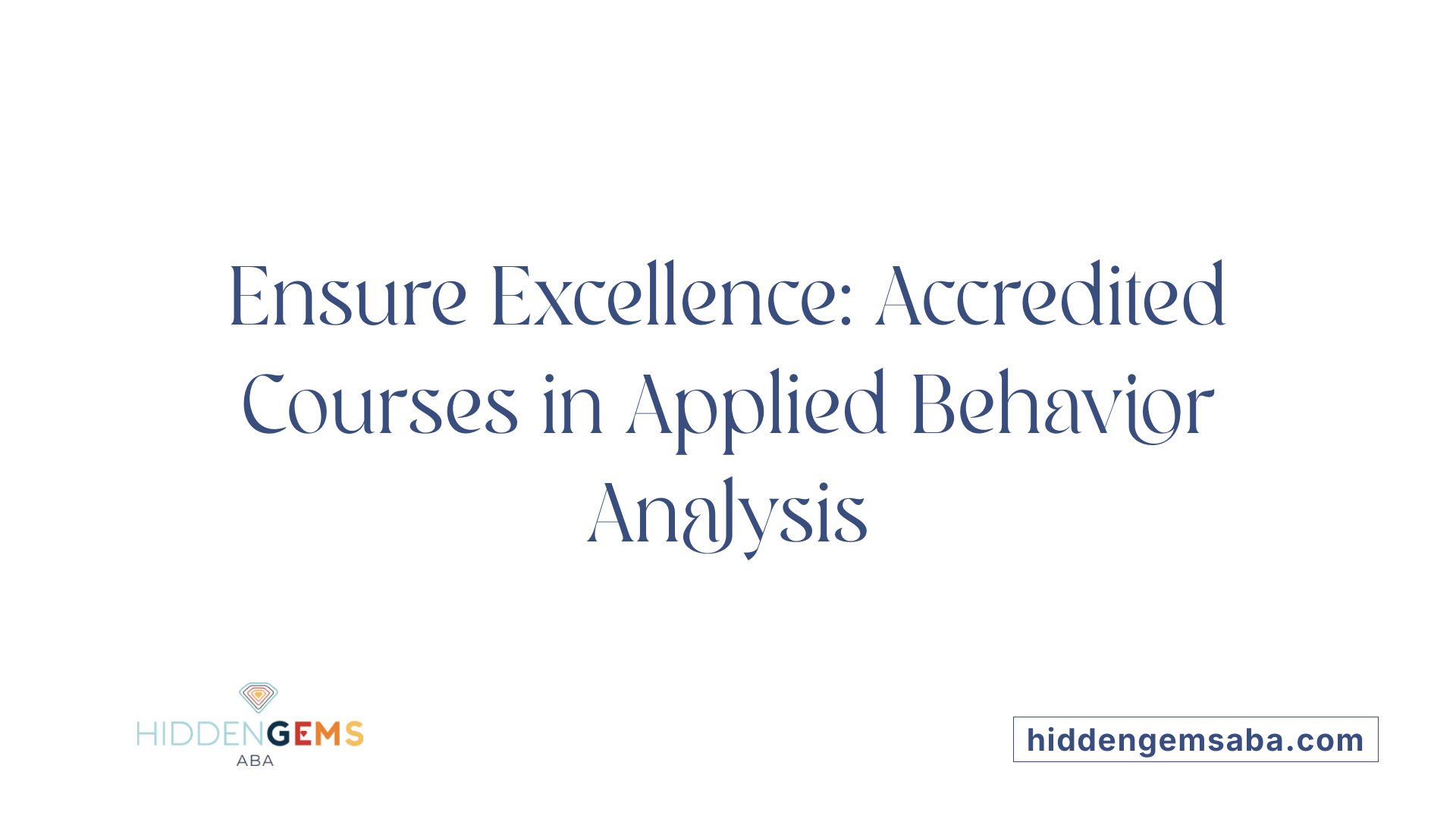Understanding ABA and Its Role in Behavioral Analysis
Applied Behavior Analysis (ABA) is a scientifically grounded approach used extensively in behavioral analysis, especially for supporting individuals with autism spectrum disorder (ASD). Rooted in behavioral principles, ABA involves tailored interventions designed to promote meaningful changes in socially significant behaviors. Its adaptability and evidence-based nature make it a cornerstone in developmental, educational, and clinical settings, fostering improvements in communication, social skills, academic performance, and daily living abilities.
The Fundamentals of ABA Therapy: Principles and Applications
What is ABA therapy and how is it applied in behavioral analysis?
Applied Behavior Analysis (ABA) is a science-driven therapy focused on understanding and modifying behavior. It is especially effective for individuals with autism spectrum disorder (ASD) and other developmental conditions. ABA applies core principles of learning and behavior to create personalized treatment plans that aim to improve socially important skills such as communication, social interaction, academic abilities, and daily living activities.
At the heart of ABA are techniques based on the scientific understanding of how behavior is affected by its environment. Professionals trained in ABA design interventions that use positive reinforcement to encourage desired behaviors. They also systematically observe and track behavior changes over time to ensure that the therapies are effective and tailored to the individual's needs.
ABA therapy is implemented by certified professionals, including Board Certified Behavior Analysts (BCBAs), who oversee program development. Therapists or Registered Behavior Technicians (RBTs) carry out these plans, consistently applying strategies and recording data to monitor progress.
The process begins with comprehensive assessments, including functional behavior assessments (FBAs), to identify antecedents and consequences that influence behaviors. By understanding these interactions, practitioners can modify environmental factors to promote positive changes.
Effective ABA programs are usually intensive, often involving more than 20 hours of therapy per week during early intervention stages. This approach has been shown to lead to significant improvements in intellectual functioning, language, and social skills, and can reduce problematic behaviors.
ABA can be provided in a variety of settings to suit the individual's environment and needs. Common settings include homes, schools, clinics, and community-based centers. Family engagement is a crucial component, ensuring that behavioral strategies are consistent across different environments and daily routines.
Systematic data collection is fundamental in ABA. Practitioners track behaviors using measurable data to evaluate the effectiveness of interventions. This evidence-based approach allows for timely adjustments and personalization, maximizing positive outcomes for each individual.
Overall, ABA therapy provides a structured, scientific method to bring about meaningful behavioral changes, supporting individuals and their families to achieve better quality of life.
Educational Pathways and Curricula for Aspiring Behavior Analysts

What are the educational pathways and curricula for becoming a behavior analyst?
Embarking on a career in behavior analysis starts with foundational education. Many aspiring behavior analysts first earn an undergraduate degree in psychology, education, or related fields. These degrees establish essential knowledge in human development, learning theories, and research methods.
Following undergraduate studies, candidates typically enroll in specialized graduate programs. These include Master’s, Doctoral, and advanced certificate programs designed to deepen understanding and practical skills in ABA. The focus of these programs is aligned with the standards set by the Behavior Analyst Certification Board (BACB), which oversees certification pathways.
There are two primary routes for BACB certification at the BCBA level. The first is Pathway 1, which involves completing an ABAI and/or APBA-accredited master’s program. These programs are comprehensive, covering core areas such as the principles of behavior, ethical practice, assessment methods, and intervention strategies.
Pathway 2 allows students to complete a master's degree supplemented with a Verified Course Sequence (VCS) verified by the Association for Behavior Analysis International (ABAI). This pathway is often chosen by students who pursue a graduate degree in related areas but need to meet specific coursework requirements for certification.
Curricula across accredited programs typically include several core components:
- Ethics and Professional Standards: Ensuring practitioners uphold ethical guidelines.
- Behavior Principles: Understanding reinforcement, punishment, and motivation.
- Behavioral Assessment: Techniques for evaluating behaviors and environmental factors.
- Intervention Strategies: Designing and implementing behavior change procedures.
- Supervised Fieldwork: Gaining hands-on experience under supervision that meets BACB standards.
Programs are delivered through various formats to accommodate different needs. Many institutions offer online courses, hybrid classes, or traditional in-person instruction. Online and hybrid models enhance accessibility for working professionals and learners in diverse geographical locations.
Several universities that provide verified postgraduate coursework include Arizona State University, Ball State University, Georgia State University, Purdue Global University, and others. These programs emphasize practitioner competence, incorporating real-world practical experiences and research opportunities.
Certification requires meeting coursework, supervised experience, and exam requirements. Many programs prepare students for the BCBA exam, which assesses their ability to apply behavioral science principles ethically and effectively.
In summary, pathways into behavior analysis involve progressive academic qualifications structured around core curricula that embed ethics, assessment, intervention, and supervised practical experience. The variety of formats available ensures accessibility for diverse learners aiming to serve individuals with autism and other developmental disabilities effectively.
Certification Standards and Licensure in Behavior Analysis
What are the certification requirements to become a BCBA?
Becoming a Board Certified Behavior Analyst (BCBA) involves fulfilling several educational, practical, and professional standards set by the Behavior Analyst Certification Board (BACB). Initially, candidates must possess a master's degree or higher from an accredited institution, with coursework that aligns with BACB requirements. This coursework typically covers essential areas such as ethical practice, assessment, intervention, and behavior analysis principles.
A critical component of certification is completing supervised fieldwork experience. Candidates must accumulate between 1,500 and 2,000 hours of practical experience. This fieldwork must be supervised by a qualified professional who meets specific BACB criteria, such as holding current certification and having relevant experience.
Following the coursework and supervised experience, candidates are eligible to sit for the BCBA certification exam. The exam consists of approximately 160 to 185 multiple-choice questions that measure knowledge across various domains of behavior analysis. It is administered through Pearson VUE testing centers, offering flexibility in scheduling.
After passing the exam, applicants must submit an application for certification, pay applicable fees, and obtain any state-specific licensure if required. Maintaining BCBA certification also involves ongoing professional development, where certified behavior analysts are expected to earn continuing education units (CEUs). These CEUs ensure professionals stay updated with current practices and adhere to ethical standards established by the BACB.
Overall, the pathway to becoming a BCBA is rigorous but designed to uphold high standards of professional competence and ethical practice, ensuring that individuals providing behavior analysis services are well-prepared to positively impact individuals’ lives.
| Certification Step | Requirements | Additional Details |
|---|---|---|
| Educational Background | Master’s degree or higher in relevant field | Coursework aligned with BACB standards, emphasis on ethics |
| Supervised Fieldwork | 1,500 to 2,000 hours, supervised by qualified BCBA | Hands-on experience in diverse settings |
| Certification Exam | 160-185 questions, administered via Pearson VUE | Multiple-choice, computer-based, flexible scheduling |
| Application and Fees | Submit application post-exam, pay fees | may include state licensure requirements |
| Continuing Education | Earn CEUs annually for recertification | Focus on ethics, new practices, and professional growth |
This structured pathway ensures that BCBA professionals meet comprehensive standards required for ethical and effective practice in behavior analysis. Their role is crucial in implementing evidence-based interventions that significantly improve the quality of life for individuals with behavioral challenges.
Career Opportunities and Professional Growth in ABA Practice
What career opportunities and professional development options exist in ABA?
Applied Behavior Analysis (ABA) offers a broad spectrum of career paths across various sectors. While many associate ABA primarily with clinical therapy for autism, the field extends into education, mental health, healthcare, organizational management, and even animal behavior.
Professionals with a master’s degree or ABA certification can take on roles such as Behavior Analyst, Clinical Director, Special Education Teacher, School Psychologist, or Social Worker. In addition, there are opportunities for roles like wellness coaches, behavioral health consultants, program coordinators, and nonprofit managers focused on behavioral health.
The industry is thriving, with the demand for ABA professionals increasing dramatically. This surge is driven by the strong evidence base supporting ABA as an effective treatment and its expanding applications across different fields. As a result, job prospects are promising, with higher salary potential for those holding certifications like BCBA (Board Certified Behavior Analyst) or BCaBA (Board Certified Assistant Behavior Analyst).
Development through certifications, workshops, and research involvement
Continuous professional growth in ABA is supported by a variety of avenues. Additional certifications, such as specialized workshops in working with diverse populations or advanced intervention techniques, help practitioners refine their skills.
Participating in research or contributing to scholarly projects can foster expertise and credibility, opening doors to higher roles within organizations or academia.
Professional organizations, like the Behavior Analyst Certification Board (BACB), offer training and certification programs that keep professionals updated on best practices and evolving standards. Attending workshops, conferences, and webinars further enhances skills and networks with other professionals.
Many practitioners also engage in ongoing coursework or pursue advanced degrees, such as doctoral programs, to deepen their understanding of complex behaviors or to move into teaching, supervision, and research roles.
Salary expectations and job outlook, with emphasis on demand surge
The job market for ABA professionals has seen extraordinary growth. From 2010 to 2021, the demand for behavior analysts increased by over 5,800%, reflecting an urgent need across multiple sectors.
Entry-level positions, such as behavior technician roles, typically start with salaries around $30,000 to $40,000 annually. With certification and experience, BCBAs can expect median salaries in the range of $64,000 or higher, depending on location and specialization.
In high-demand regions and specialized sectors like healthcare, treatment centers, or intensive autism programs, salaries can be significantly above average. The job outlook is very positive, with employment projected to grow steadily as awareness of ABA's effectiveness continues to expand.
Overall, a career in ABA not only offers meaningful work with the potential for personal and professional fulfillment but also provides robust opportunities for financial stability and upward mobility. This outlook is supported by an increasing number of accredited programs, expanding insurance and Medicaid coverage, and societal recognition of ABA’s benefits.
Recognized Accreditation and Quality Assurance in ABA Programs

Are there accredited programs or recognized institutions for ABA and behavior analysis training?
Yes, multiple institutions offer accredited programs in applied behavior analysis (ABA) and behavior analysis, ensuring adherence to high educational standards. The primary organization responsible for oversight is the Association for Behavior Analysis International (ABAI). Their Accreditation Board reviews undergraduate, master's, and doctoral programs worldwide, certifying that these meet stringent quality criteria.
Programs accredited by ABAI have demonstrated compliance with comprehensive standards, including curriculum rigor, faculty qualifications, and supervised practicum experiences. These programs not only prepare students academically but also align their coursework with the requirements set by the Behavior Analyst Certification Board (BACB) for professional certification.
Several universities have earned ABAI accreditation, such as Florida Institute of Technology, Ohio State University, Mississippi State University, and others. These institutions have undergone rigorous external review processes to ensure the quality of education and training they provide.
The accreditation process involves verifying that the curriculum covers essential content areas, such as behavioral assessment, intervention, ethics, and research methods. Faculty members are typically required to be credentialed Board Certified Behavior Analysts (BCBAs), with extensive practical experience.
Supervised practicum or fieldwork forms a vital part of these programs, providing students with real-world application under qualified supervision. This experience is crucial for meeting the fieldwork requirements to sit for the BCBA or BCaBA certification exams.
Relevance for certification and licensure is a major reason students pursue ABAI-accredited programs. These programs not only facilitate eligibility for certification but also help ensure graduates are prepared to work ethically and effectively in diverse settings, such as schools, clinics, and community agencies.
In summary, attending an ABAI-accredited program provides assurance of quality, supports certification pathways, and equips students with the knowledge and practical skills necessary for a successful career in behavior analysis.
Standards for curriculum, faculty qualifications, supervised practicum
Accredited ABA programs must meet several key standards:
- A comprehensive curriculum that covers behavioral principles, assessment, interventions, ethics, and research.
- Qualified faculty, generally required to hold BCBA or BCBA-D credentials, with substantial teaching and supervisory experience.
- Supervised practicum or fieldwork experiences, often totaling 500–1500 hours, depending on the certification pathway.
- Ethical standards are emphasized throughout the coursework, ensuring students are prepared for professional practice.
- Courses verified by ABAI align with the BACB’s content outlines, helping students meet certification requirements.
Relevance for certification and licensure
Graduates from ABAI-accredited programs typically meet the coursework eligibility criteria for the BACB certification exams. This preparation is essential for individuals seeking licensure or state certification in behavior analysis, where applicable.
These programs also promote evidence-based practices, professional ethics, and cultural responsiveness—all critical for effective service delivery and regulatory compliance.
| Program Level | Notable Accrediting Universities | Curriculum Focus | Supervised Experience Hours | Certification Support |
|---|---|---|---|---|
| Bachelor's | Some accredited universities worldwide | Foundational ABA, ethics | Not typically required | Entry-level certification eligible |
| Master's | Florida Tech, Ohio State, Mississippi State, Georgia State | Advanced ABA, ethics, assessment, intervention | 500–1500 hours | BCBA/BCaBA exam preparation |
| Doctoral | Various worldwide | Research, leadership, complex behavior | Supervised experience coupled with research | Pathway to higher-level certification |
Knowing that a program maintains accreditation provides students and employers with confidence in the quality of training, ensuring a strong foundation for future practice in behavior analysis.
Structure and Content of Graduate Programs in ABA

What is the structure and content of graduate programs in ABA?
Graduate programs in Applied Behavior Analysis (ABA) are specifically designed to combine comprehensive coursework with practical experience. These programs typically involve around 42 semester credits distributed over multiple semesters, usually lasting from one to two years, depending on full-time or part-time enrollment.
The curriculum covers fundamental and advanced topics essential for effective practice in behavior analysis. Core coursework includes principles of behavior analysis, ethical standards, behavioral assessment, behavior change procedures, verbal behavior, organizational behavior management, and research methods. These courses are carefully verified to align with the standards set by the Behavior Analyst Certification Board (BACB), ensuring students meet the requirements for certification as a BCBA.
Alongside coursework, students participate in supervised fieldwork and practicum experiences. These practical components are conducted in real-world settings such as clinics, schools, mental health centers, and community organizations. Supervised fieldwork is vital for applying theoretical knowledge to actual cases, honing skills in data collection, treatment plan development, and ethical decision-making.
Research projects and capstone experiences are integral parts of many programs. Students often engage in scholarly projects that require designing and implementing behavioral interventions, analyzing data, and presenting findings. The capstone typically culminates in a comprehensive project that demonstrates mastery of core competencies and readiness for professional practice.
Programs also prepare students for the BCBA exam by incorporating exam-focused courses, practice mock exams, and review sessions. Faculty members involved in these programs are usually experienced Board Certified Behavior Analysts, providing mentorship and supervision.
Overall, graduate ABA programs are structured to produce well-rounded practitioners equipped with the necessary knowledge, skills, and ethical considerations to serve diverse populations. They emphasize evidence-based practice, data-driven decision making, and the importance of cultural responsiveness.
This training process ensures that graduates are capable of designing, implementing, and evaluating effective behavior interventions tailored to individual needs, with a strong foundation rooted in science and ethical standards.
Research and Training Opportunities Facilitating Growth in ABA

What research and training opportunities are available in ABA therapy?
Applied Behavior Analysis (ABA) offers a wide range of research and training options for individuals interested in advancing their knowledge and skills in this field. Academic institutions play a significant role by providing university-based research labs, practicum placements, and internship programs that are designed to build practical experience.
Many universities with ABA programs have dedicated research labs where students can participate in ongoing studies, contribute to publications, and gain insight into cutting-edge behavioral sciences. For example, graduate programs such as MSABA, M.Ed., and MS in Applied Behavior Analysis often include supervised practicum or fieldwork aligned with certification standards like the BCBA. These experiences allow students to apply behavioral principles in real-world settings under the guidance of experienced professionals.
In addition to academic opportunities, professional organizations such as the Behavior Analysis Certification Board (BACB) and the Association for Behavior Analysis International (ABAI) offer workshops, conferences, and webinars. These events serve as platforms for continued education, networking, and sharing latest research. They often feature expert panels, hands-on training sessions, and the presentation of groundbreaking research.
Participation in research projects within clinics, behavioral centers, and educational settings is another avenue for growth. Many ABA practitioners engage in collaborative research, which helps improve intervention techniques and understand behavioral patterns across diverse populations.
Partnerships between universities, community clinics, and organizations like schools or mental health agencies further bolster training opportunities. These collaborations facilitate practicum placements, internships, and community-based research that directly impact clients and communities.
Overall, ABA professionals have access to extensive opportunities for ongoing education and practical training through academic programs, professional events, research participation, and community partnerships. These experiences ensure practitioners stay current with evidence-based practices and contribute to the continuous development of the field.
| Opportunity Type | Description | Typical Providers | Benefits |
|---|---|---|---|
| University Research Labs | Engage in experimental research and practical applications | Universities with ABA programs (e.g., ASU, MSU) | Deepens understanding, enhances research skills |
| Internships & Practicums | Gain hands-on experience in clinical or educational settings | ABA clinics, schools, behavioral centers | real-world skills, supervision for certification |
| Workshops and Webinars | Keep current with recent advances | ABAI, BACB, professional conferences | Continuing education, networking opportunities |
| Conferences and Symposia | Present research, learn from experts | ABAI Annual Conference, regional events | Exposure to innovations, professional growth |
| Community & Clinic Partnerships | Involvement in field research and services | Local clinics, developmental centers | Practical experience, societal impact |
In conclusion, the landscape of ABA research and training is rich and continuously evolving. Aspiring and current behavior analysts can access a variety of pathways to develop their expertise, contribute to scientific understanding, and improve interventions for individuals with behavioral needs.
Fostering a Skilled and Ethical ABA Workforce
The landscape of ABA therapy and behavioral analysis programs is rich with educational pathways, rigorous certification standards, and diverse career opportunities. With accredited programs guided by organizations like ABAI and BACB, aspiring professionals can acquire the necessary knowledge, skills, and ethical understanding to make a meaningful impact. As demand continues to grow, especially in applied settings supporting individuals with autism and developmental disabilities, a well-trained workforce is essential for delivering effective, evidence-based interventions. Continuous research, professional development, and adherence to high standards ensure that those in the field can contribute to transformative improvements in behavior and quality of life across populations. Embracing these opportunities helps foster a knowledgeable, competent, and ethical community of behavior analysts dedicated to advancing the science and practice of ABA.
References
- Applied Behavior Analysis Degrees
- Applied Behavior Analysis (ABA) | Autism Speaks
- Applied Behavior Analysis Master's (ABA) - ASU Online
- Applied Behavior Analysis Programs
- Master's Degree in Applied Behavior Analysis (ABA)
- Master of Science in Applied Behavior Analysis
- Online Master's in Applied Behavior Analysis (ABA) - Purdue Global






